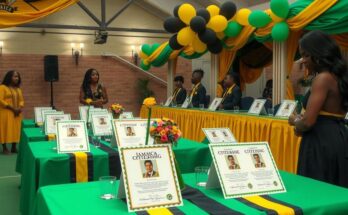Rwanda’s Catholic Bishops engaged in a training program at the country’s “school of Synodality” aimed at cultivating “true missionaries of synodality.” The training emphasized synodal methods of listening and discernment, with insights from previous synodal experiences. Key figures like Bishop Sinayobye and Fr. Costa highlighted the significance of communal involvement and the ongoing process of synodality as a response to local needs and contexts.
Rwanda’s Catholic Bishops have participated in a recent five-day training program hosted by the nation’s “school of Synodality,” aimed at developing “true missionaries of synodality.” This capacity-building event, attended by diverse members of the Church, focused on how to foster a more Synodal Church in Rwanda, guided by suggestions from the Synodal path.
Bishop Edouard Sinayobye of Cyangugu Diocese emphasized the importance of this training, stating that it was convened to cultivate true missionaries within their communities. Utilizing insights from the Final Document of the XVI Ordinary General Assembly, participants aimed to explore key themes and practice Synodal methods of listening and discernment through Lectio Divina.
Reflecting on the initiative, Bishop Sinayobye noted that the synod experience had been characterized as a “Kairos, a time of grace and renewal.” He remarked on the Rwandan Church’s desire for communion and unity, seeking to walk together and support one another as a community.
Fr. Giacomo Costa, a facilitator from the General Secretariat of the Synod, highlighted the significance of previous listening efforts by the Rwandan diocesan teams, who made concerted efforts to engage all members of their communities. Fr. Costa pointed out that the implementation phase of the Synod should draw from past experiences to enhance effective engagement.
During his observations, Fr. Costa acknowledged the active participation of the Rwandan dioceses in the Synodal process, underscoring the shared responsibility of the faithful within the Church’s mission. He stressed the importance of fostering a listening process that goes beyond merely conveying information to provide a transformative communal experience.
The March 7 press release noted the involvement of Mario Cardinal Grech, Secretary General of the Synod of Bishops, who stated that the Synod on Synodality continues and that the Final Document should guide the implementation phase. He asserted that real change requires incorporating diverse local contexts, reflecting on the unique histories and cultures of different Churches, particularly in Africa.
In conclusion, the training for Rwanda’s Catholic Bishops reflects a commitment to nurturing a Synodal Church that prioritizes communion and unity. Participants engaged in profound discussions centered on listening and discernment, guided by the experiences of the synodal journey thus far. The collective responsibility for the Church’s mission was emphasized, reinforcing the transformative potential of collaborative efforts among the faithful. The involvement of Church leaders such as Cardinal Grech indicates a sustained focus on the synodality process across various local contexts, particularly in Africa.
Original Source: www.aciafrica.org




